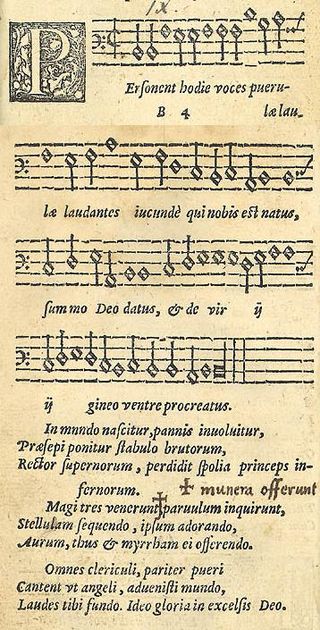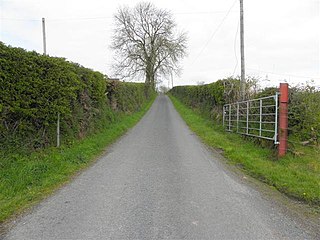| Title | Composer / Lyricist | Year | Notes |
|---|
| "The Twelve Days of Christmas" | Traditional with additions by Frederic Austin | c. 1780 | |
| "Adam lay ybounden" | Set by numerous composers, most notably by Boris Ord and Peter Warlock | 15th century | |
| "A Christmas Carol" | words and music: Charles Ives | 1897 [8] | |
| "A Great and Mighty Wonder" | lyrics: The words of St Germanus were translated by John Mason Neale (1818–1866) tune: Michael Praetorius (1571–1621) written originally to the lyrics of Lo, How a Rose E'er Blooming. | 1599 | |
| "Angels from the Realms of Glory" | lyrics: James Montgomery; music: Henry Thomas Smart, 1867, to the tune of "Regent Square". In the UK a slightly different arrangement of "Angels We Have Heard on High" ("Gloria") | 1816 | |
| "Angels We Have Heard on High" | based on traditional hymn "Gloria" (a French traditional carol "Les Anges dans nos Campagnes"); English translation by Bishop James Chadwick, tune arranged by Edward Shippen Barnes | 1862 | |
| "As with Gladness Men of Old" | William Chatterton Dix | 1867 | Set to same tune as "For the Beauty of the Earth" |
| "Away in a Manger" | First two stanzas unknown, often erroneously attributed to Martin Luther; third stanza written by John McFarland (1904) | 1882 | More than 40 settings are known. Most popular US version is by James R. Murray (1887); The most popular UK version is by another American, William J. Kirkpatrick (1895) |
| "The Babe in Bethlem's Manger" | Kentish traditional | | |
| "Beautiful Star of Bethlehem" | Robert Fisher Boyce | 1940 |
| "Benedicamus Domino" | lyrics: Rev. C L Hutchins | 1916 | Several settings, including Ben Emberley (2022) |
| "Bethlehem Down" | Peter Warlock (composer)
Bruce Blunt (poet) | 1927 | Mostly used in Christmas and Epiphany services of the Anglican church |
| "Boar's Head Carol" | English traditional | 15th century | |
| "Brightest and Best" ("Star of the East") | written by Reginald Heber | 1811 | Not to be confused with the American "Star of the East" |
| "Calypso Carol" ("See him lying on a bed of straw") | Michael Perry | 1969 | Written in 1964 for a college concert |
| "Candlelight Carol" | John Rutter | 1984 | |
| "Carol of the Bells" | Mykola Leontoyvch, Peter J. Wilhousky | 1904 | The song is based on a folk chant known in Ukrainian as "Shchedryk". |
| "The Cherry-Tree Carol" | English traditional | | |
| "Children, Go Where I Send Thee" | traditional African American spiritual | | |
| "Christians, awake, salute the happy morn" | John Byrom, music by John Wainwright | c. 1750 | Based on a poem of three 16 line stanzas, originally for the author's daughter, which was later reworked into singable verses. |
"Christmas Song"
("Chestnuts Roasting on an Open Fire")
("Merry Christmas to You") | Robert Wells and Mel Tormé | 1945 | |
| "Come and I will sing you" | English traditional | Early 19th Century or before | Musicologist Cecil Sharp, influential in the folklore revival in England, noted in his 1916 One Hundred English Folksongs that the words are "so corrupt, indeed, that in some cases we can do little more than guess at their original meaning" |
| "Come, Thou Long Expected Jesus" | Charles Wesley | 1749 | Set to Hyfrydol |
| "Coventry Carol" ("Lullay, Thou Tiny Little Child") | English traditional | | |
| "Ding Dong Merrily on High" | music: Jehan Tabourot, words: George Ratcliffe Woodward | | Tune originally entitled "Branle de l'Official". |
| "Down in Yon Forest" | English traditional | | The "Corpus Christi Carol" |
| "Do You Hear What I Hear?" | written by Noël Regney and Gloria Shayne | 1962 | |
| "Far, Far Away on Judea's Plains" | words and music: John Menzies Macfarlane | 1869 | |
| "The First Noel" ("The First Nowell") | English traditional | 1823 | First published in Carols Ancient and Modern by William Sandys |
| "The Friendly Beasts" | French Traditional | 12th century | English by Robert Davis 1934 |
| "Gabriel's Message" | translated into English by Sabine Baring-Gould | | from the Basque traditional carol "Birjina gaztettobat zegoen" |
| "Gloucestershire Wassail" | English Traditional | 18th century or earlier | Numerous publications of the present-day music were published in the 1800s along with variations of lyrics. It's known to have been sung at least as far back as the late 1700s. [9] |
| "Go Tell It on the Mountain" | African American spiritual dating at least to 1865 Lyrics by John W. Work | 1865 | |
| "Good King Wenceslas" | English traditional | 1853 | John Mason Neale, Thomas Helmore |
| "God Rest You Merry, Gentlemen" | English traditional | c. 1760 | Published by William Sandys; author unknown |
| "Good Christian Men, Rejoice" | Heinrich Seuse | 1328 | English lyrics fitted to the Latin hymn-tune "In dulci jubilo"; also known as "Good Christian Friends, Rejoice" |
| "Hark! The Herald Angels Sing" | *music: Felix Mendelssohn, words: Charles Wesley, amended by George Whitefield and Martin Madan | 1739 | originally as part of Festgesang, adapted and harmonised by William Hayman Cummings; descant for verse 3 added in 1961 by Sir David Willcocks for the Carols for Choirs books |
| "Here We Come A-wassailing" | English traditional | c. "1850" | |
| "The Holly and the Ivy" | English traditional | | |
| Huron Carol ("Jesous Ahatonhia") | Jean de Brébeuf | 1643 | "Jesus, he is born". Also known as "Twas in the Moon of Wintertime" after English translation (1926) by Jesse Edgar Middleton. |
| "I Heard the Bells on Christmas Day" | words: Henry Wadsworth Longfellow | | Several settings of music have been popular: Joseph Mainzer (1845) John Baptiste Calkin (1872) Johnny Marks (1956) |
| "I Saw Three Ships (Come Sailing In)" | English traditional | 1833 | Published by William Sandys. |
| "In the Bleak Midwinter" | words: Christina Rossetti, music: versions by Gustav Holst and Harold Darke | | |
| "Infant Holy, Infant Lowly" ("W żłobie leży") | Polish traditional | | |
| "It Came Upon the Midnight Clear" | words: Edmund Hamilton Sears | 1849 | music (US): "Carol" Richard Storrs Willis music (UK): "Noel", melody arranged and adapted by Arthur Sullivan |
| "Jesus Christ the Apple Tree" | Elizabeth Poston | | |
| "Jingle Bells" | James Lord Pierpont | 1857 | Originally titled "One Horse Open Sleigh"; and written for a school Thanksgiving pageant. |
| "Joy to the World" | words: Isaac Watts based on Psalm 98, music: arranged by Lowell Mason based on themes in Handel's Messiah | 1719 | |
| "Judea" | music: William Billings | | |
| "Little Donkey" | written by Eric Boswell | 1959 | |
"The Little Drummer Boy"
("Carol of the Drum") | written by Katherine K. Davis | 1941 | |
| "Love Came Down at Christmas" | words: Christina Rossetti, music: various | 1885 | |
| "The Lord at first did Adam make" | words: West Country traditional | | |
| "Mary's Boy Child" | Jester Hairston [10] | 1956 | |
| "Masters in This Hall" | written by William Morris | c. 1860 | |
| "Night of Silence" | words and music: Daniel Kantor | 1981 | written to be sung simultaneously with "Silent Night" |
| "O Come, All Ye Faithful" (Adeste Fideles) | 17th century carol. English translation by Frederick Oakeley in 1841. | | |
| "O Holy Night" | words: Placide Cappeau de Rouquemaure, translated by John Sullivan Dwight, music: Adolphe Adam | 1847 | |
| "O Little Town of Bethlehem" | words: Phillips Brooks | 1867 | music (US): Lewis H. Redner, music (UK): traditional tune: "Forest Green" (a.k.a. "The Ploughboy's Dream") |
| "Of the Father's Heart Begotten" ("Of the Father's Love Begotten") | music: tune from Piae Cantiones | | |
| "Once in Royal David's City" | words: Cecil Frances Humphreys Alexander, music: Henry John Gauntlett (Irby) | 1849 | |
| "Past Three O'Clock" (or "Past Three a Clock") | English traditional, with verses written by George Ratcliffe Woodward | | first published in The Cowley Carol Book with a harmonisation by Charles Wood |
| "Rise Up Shepherd and Foller" | African American spiritual [11] | c. 1909 | Also known as "Rise Up Shepherd and Follow" |
| "The Rocking Carol" | Loose translation of Czech traditional carol "Hajej, nynej, Ježíšku" by Percy Dearmer | 1928 | First published in the Oxford Book of Carols (1928) |
| "Rudolph the Red-Nosed Reindeer" | Johnny Marks | 1949 | |
| "Sans Day Carol" | Cornish traditional | | |
| "See, amid the Winter's Snow" | words: Edward Caswall, music: John Goss | | |
| "The Seven Joys of Mary" | English traditional | | |
| "Shepherds Arise" | anon., Dorset | 19th century | published 1926 by W. A. Pickard-Cambridge |
| "Silver Bells" | Jay Livingston and Ray Evans | 1950 | |
| "Sir Christèmas" | composed by Rev. Richard Smart | 15th century | |
| "Sleep, Baby, Sleep" | words: John Addington Symonds | 1885 | Setting by Ben Emberley (2023) |
| "Star of the East" | written by Alfred Hans Zoller, translation by George Cooper in 1890, music by Amanda Kennedy in 1883 | 1890 | Not to be confused with the English carol titled "Star of the East" or "Brightest and Best" |
| "Sussex Carol" ("On Christmas Night All Christians Sing") | English traditional | | |
| "Sweet Little Jesus Boy" | Robert MacGimsey | 1934 | Imitates the African American spiritual-style. |
| "This Endris Night" | Traditional | 15th century | |
| "There Is No Rose" | written by Benjamin Britten | | From "A Ceremony of Carols" |
| "Torches" | composed by John Joubert | 1951 | |
| "Unto Us a Boy is Born" ("Unto Us is Born a Son") | English traditional | | |
| "A Virgin Unspotted" ("A Virgin Most Pure") | English traditional | | |
| "We Three Kings of Orient Are" ("Three Kings of Orient") | written by Rev. John Henry Hopkins | 1863 | An Epiphany carol |
| "What Child Is This?" | music: traditional English song "Greensleeves", words: William Chatterton Dix | 1865 | |
| "Whence Is That Lovely Fragrance Wafting" ("Whence Is That Goodly Fragrance Flowing?") ("Quelle est cette odeur agréable?") | French traditional | | |
| "While by My Sheep I Watched at Night" | | | |
| "While Shepherds Watched Their Flocks" | words: Nahum Tate, music (UK): "Winchester Old" from Este's Psalter adapted from Christopher Tye, music (US): adapted from Handel, 1728; arranged in Harmonia Sacra, 1812. | 1700 | |
| "With Wondering Awe", the Wisemen Saw... | music and verse: Anon | | |
| "Wolcum Yole" | Written by Benjamin Britten | | From "A Ceremony of Carols" |
| "Zither Carol" | | | |










